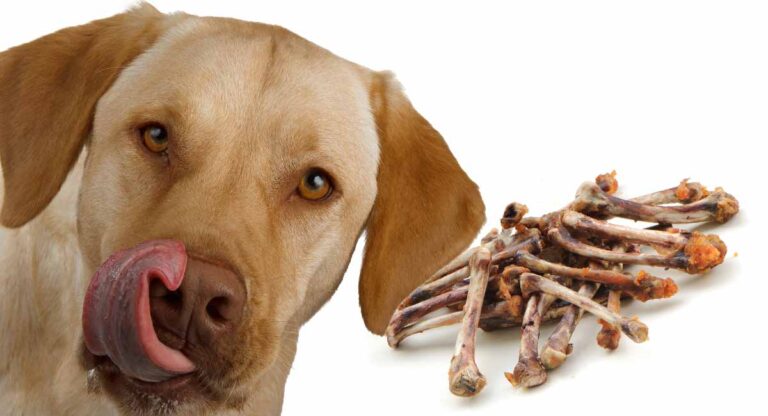If a dog eats a chicken bone, it can cause internal injury or blockage in its digestive system. Chicken bones are brittle and can splinter, causing harm to the dog’s throat, stomach, or intestines.
Dog owners should be cautious when feeding their pets bones and ensure they are not too small or prone to splintering. In the event that a dog does ingest a chicken bone, it is imperative to monitor the animal for signs of distress, such as vomiting, diarrhea, or abdominal pain.
Seeking immediate veterinary attention is crucial to address any potential complications. We will explore the risks associated with dogs consuming chicken bones and provide guidance on how to prevent such incidents from occurring.

Credit: minimalistbaker.com
What Happens If A Dog Eats A Chicken Bone: The Dangers Unveiled
When a dog ingests a chicken bone, it can pose serious risks to their health. The sharp edges of the bone can cause tears or punctures in the digestive tract, leading to digestive obstructions. Symptoms of this can include vomiting, diarrhea, and abdominal discomfort. Additionally, chicken bones have the potential to splinter, causing further harm to the esophagus, stomach, or intestines. If you suspect your dog has eaten a chicken bone, it is crucial to take immediate action by contacting a veterinarian. The vet may recommend monitoring your dog for any signs of distress, inducing vomiting, or performing imaging tests to assess the situation. Understanding the risks involved in allowing your dog to have access to chicken bones is essential for safeguarding their well-being.
Chicken Bones And Canine Health
Consuming chicken bones can pose serious health risks for dogs. The danger lies in the fact that cooked bones are more brittle and prone to splintering, while raw bones are less likely to break apart. When dogs ingest chicken bones, they are at risk of internal injuries such as punctures or obstructions. These hazards stem from the sharp edges and potential fragments of the bones. Owners must understand the anatomical risks associated with chickens bones in dogs, and take preventative measures to ensure their pets’ safety.
Recognizing A Problem
If a dog eats a chicken bone, it can pose serious health risks. It’s crucial to recognize the problem and seek prompt veterinary care. Symptoms of bone ingestion may include choking, vomiting, or abdominal pain. Seeking professional help is essential to prevent potential complications.
| Recognizing a Problem |
| Signs your dog may have eaten a chicken bone If your dog has ingested a chicken bone, watch for signs such as gagging, choking, drooling, pawing at the mouth, vomiting, lethargy, or abdominal pain. Symptoms that indicate your dog is in distress These symptoms can indicate that the bone has become lodged or has caused an injury. If you notice these signs, it’s time to seek veterinary attention. When to seek veterinary attention If your dog is displaying any of the above symptoms, it’s crucial to seek immediate veterinary care, as complications from ingesting a chicken bone can be severe. Untreated, it can lead to perforation of the intestines, internal bleeding, or obstruction, all of which are life-threatening conditions for your pet. |
Emergency Response To Bone Ingestion
If a dog eats a chicken bone, it can lead to serious health risks. The sharp edges of the bone can cause internal injuries or blockages in the gastrointestinal tract. Immediate actions are crucial in such cases, including carefully observing the dog for signs of distress, vomiting, or difficulty in defecating. If you suspect that your dog has ingested a bone, it is essential to seek veterinary assistance right away.
Transporting the dog to the vet safely is important to prevent further complications. Ensure that the dog is kept calm and comfortable during transportation. X-rays and imaging play a vital role in diagnosing the extent of the issue and guiding the necessary treatment. Prompt professional intervention is necessary to safeguard the well-being of the dog.
Veterinary Treatments And Procedures
If a dog eats a chicken bone, it can lead to serious health risks, including intestinal blockage or injury. Veterinary intervention may be required to address the situation. To address this issue, veterinarians may recommend treatment options such as monitoring the dog’s condition, performing X-rays to assess the bone’s location, or in severe cases, surgical intervention to remove the bone. Post-operatively, providing careful monitoring and ensuring the dog follows a specialized post-operative diet are crucial for a successful recovery. This typically involves feeding the dog easily digestible foods and avoiding any potential irritants. Moreover, it is important to closely adhere to the veterinarian’s instructions and schedule follow-up appointments for regular check-ups to ensure the dog’s recovery progresses as intended. Understanding the post-operative care and recovery process for dogs that have ingested chicken bones is vital to ensuring their well-being.
Preventing Future Incidents
It is important to train your dog to avoid bones and provide safe alternatives for chewing. This can be done by offering chew toys or chew treats that are specifically designed for dogs. Avoid giving them chicken bones or any other small bones that could pose a choking hazard. Additionally, it’s essential to supervise your dog, especially during meal times, and teach them the “drop it” command. Prevent accidental ingestion by securing the trash and being mindful of where you discard bones. By taking these precautions, you can reduce the risk of your dog ingesting a chicken bone and ensure their safety and well-being.
Frequently Asked Questions For What Happens If A Dog Eats A Chicken Bone
Is It Dangerous For A Dog To Eat Chicken Bones?
Yes, it can be dangerous as the bones can splinter and cause internal injuries to the dog’s digestive system.
What Should I Do If My Dog Eats A Chicken Bone?
If your dog eats a chicken bone, monitor for signs of discomfort or distress and consult a vet immediately for advice.
Can Chicken Bones Cause Harm To A Dog’s Stomach?
Yes, chicken bones can splinter and potentially injure the stomach lining or cause blockages in a dog’s digestive system.
Conclusion
After understanding the potential risks, it’s clear that dog owners should take extra precautions with chicken bones. Prompt action and close monitoring can prevent serious health issues. Always prioritize your pet’s well-being by ensuring a safe environment and offering appropriate treats.
Stay informed, be cautious, and keep your furry friend healthy!



